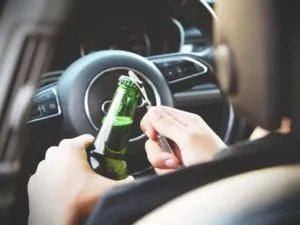Drunk driving accidents in Hamilton and throughout Butler County can be devastating. Every year, drunk drivers cause serious and deadly collisions in Ohio and across the country. According to the National Highway Traffic Safety Administration (NHTSA), an average of 32 people die in drunk driving accidents every day in the United States. That number comes out to one death every 45 minutes. In total, nearly 12,000 people are killed annually because of drunk driving. According to the U.S. Centers for Disease Control and Prevention (CDC), Ohio has a rate of drunk driving deaths that is higher than the national average. In addition, more people in Ohio report driving after drinking too much alcohol. If you or someone you love sustained injuries in a drunk driving accident, you are likely wondering about your options for bringing a drunk driving claim. It is important to learn about Ohio insurance and personal injury laws concerning drunk driving claims.
Bringing an Auto Insurance Claim After a Drunk Driving Accident in Butler County
After a drunk driving accident, you should be thinking about bringing a drunk driving claim. What does it mean to bring a claim? In general, the claims process usually starts with an auto insurance claim. Then, if the auto insurance settlement is insufficient, you can bring a civil claim to court. In other words, you may be able to file a lawsuit against the drunk driver or another liable party.
Ohio Auto Insurance: General Rules and Requirements
Ohio auto insurance law has many rules and requirements that you should know about when bringing a claim. First, Ohio requires drivers to carry minimum amounts of liability coverage. Those minimum liability coverage amounts are as follows:
- $25,000 for injury or death to a single person in a collision;
- $50,000 for injury or death to two or more people in a collision; and
- $25,000 for property damage in a single accident.
For a free legal consultation, call 513-894-3333
These minimum amounts can also play a role in determining what kind of insurance payout you will receive. If you have sustained damages or losses beyond the minimum amount carried, you will not be able to obtain full compensation for your losses. In such cases, it may be necessary to file a drunk driving accident lawsuit. The process of bringing an auto insurance claim after a drunk driving crash can be complex. As such, it is important to know the rules and to understand your rights. The Ohio Department of Insurance clarifies that a person bringing a claim has the following rights:
- Right to a prompt and good-faith settlement offer according to the terms of the insurance policy;
- You can negotiate any settlement offers with the insurance adjuster;
- Right to use an arbitration procedure in the insurance policy; and
- You can choose where you will have your vehicle repaired (unless the policy provides specifics).
Your responsibilities when filing a claim include:
- Not filing a phony or fraudulent claim;
- Promptly reporting an accident to your insurance company and abiding by the reporting policies in your insurance policy;
- Cooperating with any claims investigation, including by providing the information requested by the insurance company;
- Paying for losses above the policy limits; and
- Informing the insurance company immediately of a claim or lawsuit that may require payment by the insurance company.
Third-Party Versus First-Party Auto Insurance Claims
After a drunk driving accident, you will need to decide whether you will be bringing a drunk driving claim through your insurance policy or the at-fault driver’s policy. A claim filed through your policy is a first-party claim. Then, a claim filed through the at-fault driver’s policy is known as a third-party claim. Since Ohio is a “fault” state or a “tort” state, you can usually choose whether to bring a first-party or third-party claim. There are benefits and limitations to each approach.
Click to contact our lawyers today
With a first-party claim, you will be responsible for your deductible initially. Your insurer will attempt to recoup the deductible through subrogation, but that can take time. As a benefit of a first-party claim, you may not face insurance limits that could limit your settlement. Further, the claims process may go more quickly. With a third-party claim, you will not need to pay a deductible since you will file through the drunk driver’s policy. However, if more than one party was injured, liability limits could affect your ability to receive fair compensation. In addition, the claims process may take more time.
How Should I Communicate With the Insurance Company?
Complete a Free Case Evaluation form now
When you are bringing an auto insurance claim after a drunk driving accident, regardless of whether you are filing a third-party or a first-party claim, you should limit the conversation with the insurer. It is important to understand that you should not discuss any subjective information concerning the drunk driving accident with an auto insurance agent, adjuster, or any other party that works for the insurance company. To be clear, insurance companies are never on the side of the parties seeking compensation through an insurance claim. You might assume that your auto insurer is there for you because you have been a loyal customer and have consistently paid your premiums on time. However, it is critical to know that no insurer is on the side of an insured or of a claimant.
Accordingly, when you initially report the accident to your insurer, you should keep the conversation brief. You should report the basic facts and avoid any commentary. Once you have filed your claim, you will likely need to provide a statement to the insurance company through which you have filed the claim. In addition, you may be asked to answer follow-up questions or to respond to certain inquiries. At no point should you admit fault or make any statements that could be understood as an admission of fault. The insurer could try to use your words against you to deny your claim. Your goal is to obtain a fair settlement for the injuries you sustained in the drunk driving accident. As such, stick to the objective facts when you are communicating with any insurance company representative.
How Do I Negotiate With the Insurance Company for a Fair Settlement?
You have the right to negotiate with the insurance adjuster for a fair settlement. In most auto insurance claims following a drunk driving accident, the claimant will negotiate. Indeed, for most insurance claims, the first offer is not the highest offer you can obtain. When you are negotiating a settlement, it is important to have a number in mind. You should determine your total losses and think about the appropriate settlement amount. If the insurance adjuster will not increase the offer, you should ask for an explanation. Remember, you have a right to a settlement that is both prompt and made in good faith.
Does Bringing a Claim Also Mean Filing a Lawsuit After a Drunk Driving Accident?
Often, the term “bringing a claim” refers to the process of filing a lawsuit following a drunk driving accident. In general, a person who has been injured in a drunk driving crash will bring a lawsuit against a liable party or parties only after seeking compensation through an auto insurance claim, and only after any auto insurance payout is insufficient to cover losses. The lawsuit will typically come after an insurance claim, in other words.
To file a lawsuit against one or more at-fault parties, you will need to be sure to file your lawsuit within two years from the date of the drunk driving accident according to Ohio law. Given that auto insurance claims can take some time to process — including phases of negotiation with the insurer for a payout — it is important to keep your eye on that clock. Once the two-year statute of limitations runs out, your lawsuit will become time-barred under Ohio law and you will not be able to obtain compensation through a civil lawsuit.
What is the Timeline for Bringing a Drunk Driving Claim?
When you are bringing an auto insurance claim to seek coverage for your losses, including medical care and property damage, you will likely need to report the initial accident to your own auto insurance company as soon as possible, as we noted above. Even if you are planning to file a third-party auto insurance claim through the drunk driver’s auto insurer, you will need to report the accident as soon as you can according to your policy. Ohio law does not specify a clock for filing an auto insurance claim, but it is important to know that the auto insurance company’s policy may have a specific timing requirement. In general, you should move forward with an auto insurance claim as soon as possible, especially given that an auto insurance claim can take quite a bit of time to resolve.
As noted above, the statute of limitations for a drunk driving accident civil claim is two years from the drunk driving accident. One of the reasons that it is so important to file an auto insurance claim quickly is that the investigation and negotiation processes involved in an insurance claim can take a significant amount of time. You will not want to risk losing your ability to file a lawsuit because your claim became time-barred while you were waiting to find out about an insurance settlement.
Will My Own Fault Affect My Settlement?
When you are bringing an auto insurance claim, it is important to avoid any admission of guilt. If the insurance company believes you are partially at fault, it could affect your settlement offer. In addition, if the insurance company has evidence of your partial liability, your ability to negotiate may be limited. When an insurance company has evidence to suggest that you are entirely at fault, it may deny your claim. However, in accidents involving drunk drivers, the drunk driver almost always bears some responsibility. Indeed, in most drunk driving claims, the drunk driver is wholly at fault for the crash. While your fault could impact the settlement offer you receive from the insurer, you can provide evidence to show that the drunk driver was at fault and that you are entitled to a fair settlement.
If you file a lawsuit after an insurance claim, allegations of your fault in the civil lawsuit could result in a reduction of damages. Ohio uses a modified comparative fault system. Under that system, a person injured in a drunk driving accident can recover damages even if they are at fault. As long as the plaintiff is not 51% or more at fault, they will recover. However, their damages award will be reduced based on their percentage of fault. What will happen if the court says you are 51% or more at fault? Under these circumstances, you would be barred from recovery. This is true even if the drunk driver was 49% at fault for the accident.
Contact a Hamilton Drunk Driving Claims Lawyer for Assistance
When you have been injured in a drunk driving accident, you should know that you may be able to obtain compensation by bringing a drunk driving claim. Drunk drivers frequently cause devastating collisions in Butler County, and vehicle occupants and pedestrians suffer life-threatening and fatal injuries. The first step in bringing a claim is usually to report the accident to your insurer and then move forward with an insurance claim. When the insurance claim is insufficient, you may be able to file a civil claim and bring the drunk driver to court.
Our Hamilton drunk driving accident lawyers can assist you every step of the way. We can begin working with you from the moment of the accident. An attorney at our firm can assist you with the insurance claim. In addition, we can negotiate with the insurer on your behalf. We will work tirelessly to negotiate a fair settlement for you. When insurance limits affect your payout or the insurance company will not offer full compensation, we can represent you in a lawsuit. Contact the law firm of Kruger & Hodges online, or give us a call at 513-894-3333 for assistance.
Call or text 513-894-3333 or complete a Free Case Evaluation form




